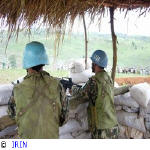A UN Security Council team has mooted eventually withdrawing peacekeepers from the Democratic Republic of Congo - the world's largest UN mission.

The prospect was raised when diplomats on a tour of Africa's hotspots met Congolese President Joseph Kabila in his palace on the River Congo's banks.
President Kabila reportedly said he hoped the UN could leave before the next presidential elections in 2011.
But it would still be needed for local elections next year, he added.
War raged across Congo between 1996 and 2002.
'Clear vision'
Despite the Security Council's optimistic reading of the meeting with President Kabila - one diplomat praised President Kabila's "clear vision" for the country - hostilities still continue in the east of DRC.
The UN has helped Congo contain the worst of the war here.
At its height, half a dozen foreign armies were intervening in the power vacuum left by weak or non-existent central government, with foreign and local soldiers looting Congo's rich resources.
In the past few years hostilities have been largely confined to fighting between government and militia forces in eastern Congo, near the border with Rwanda.
But the conflict in the east has always been the epicentre of Congo's problems - so until that is resolved, the country will not be stable.
Nevertheless, the leader of the Security Council mission, French UN Ambassador Jean Maurice Ripert, was optimistic.
Mr Ripert said President Kabila had agreed that once security had returned, the UN forces could withdraw.
The French envoy stressed that this would "not be tomorrow".
The last presidential elections, in 2006, descended into military confrontation when the results came out between forces loyal to Joseph Kabila and those of his principal opponent, Jean Pierre Bemba.
Mr Bemba subsequently went into exile in Europe.
He was indicted by the International Criminal Court last month, then swiftly arrested in Europe for leading troops who allegedly committed war crimes.
Not surprisingly, in a general reference to the several indictments and arrests the court had made in Congo, including that of his principal opponent, Mr Kabila was reported by a source in the meeting to have said these arrests were "a good thing".
Related articles
- • Felix Tshisekedi Sworn In as DR Congo President (January 24, 2019)
- • Constitutional Court Declares Tshisekedi Winner of Presidential Election (January 19, 2019)
- • Felix Tshisekedi Vows to Be the President of All Congolese (January 10, 2019)
- • Felix Tshisekedi Elected DR Congo President (January 10, 2019)
- • DR Congo Delays Results of December Election (January 6, 2019)
- • Botswana Urges Joseph Kabila to Step Down (February 26, 2018)
- • No elections in DR Congo in December without electronic voting machines: INEC (February 13, 2018)
- • US Warns DR Congo Against Electronic Voting for Delayed Election (February 12, 2018)
- • Felix Tshisekedi accuses INEC of illegally prolonging Kabila's mandate (October 24, 2017)
- • DRC Seeks Arrest of Presidential Candidate Moise Katumbi (May 19, 2016)
- • Papa Wemba Is Buried in Kinshasa (May 4, 2016)
- • Papa Wemba Awarded Highest National Honor as Thousands Pay Tribute (May 2, 2016)
- • Rights Groups: DR Congo Must Free Pro-democracy Activists (April 13, 2015)
- • Police Open Fire on Crowd Protesting Election Law Change (January 19, 2015)
- • Etienne Tshisekedi Evacuated to Belgium for Medical Treatment (August 16, 2014)
- • Kerry Calls on Kabila to Honor Constitution (May 4, 2014)
- • Kerry in DR Congo for Security Talks (May 3, 2014)
- • DR Congo Takes Chairmanship of COMESA at Summit in Kinshasa (February 26, 2014)
- • DR Congo Honors Nelson Mandela, Hero and Model for Humanity (December 6, 2013)
- • Kabila Congratulates Congo Army for Defeating M23 Rebels (October 30, 2013)
- • DR Congo Eases Process for Starting a New Business (June 3, 2013)
- • Regional Leaders Sign DR Congo Peace Deal (February 24, 2013)
- • The M23 Rebels Want to Overthrow Kabila? Nonsense (November 28, 2012)
- • Thousands of Women March Against M23 Rebels in Kinshasa (November 24, 2012)
- • Protests Against M23 Rebels, Government and UN Spread (November 22, 2012)
- • Thousands Protest M23 Capture of Goma, Turn on Government and UN (November 21, 2012)
- • DR Congo Officials Vow to Defend Goma Against M23 Rebels (November 19, 2012)
- • At high-level meeting, Ban urges political solution to crisis in eastern DR Congo (September 27, 2012)
- • US Cuts Military Aid to Rwanda Over Support to Rebels in DR Congo (July 21, 2012)
- • DR Congo, Rwanda Sign Pact to Fight Rebels in Eastern Congo (July 15, 2012)







